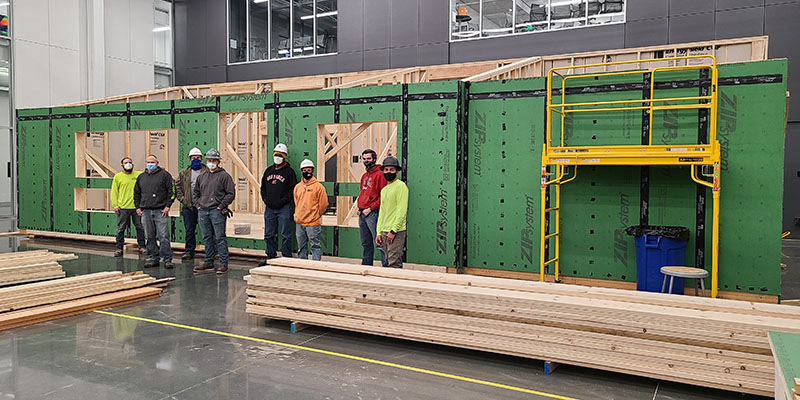Sustainable ‘tiny house’ project making progress
Despite the challenges presented by the coronavirus, the area’s first sustainable small house is moving closer to completion.
What is a sustainable house? The way project coordinator Bing Chen describes it, it is a small, ADA-compliant house about the size of a studio apartment that is self-sufficient. That means it incorporates passive solar heating, solar electrical generation, and a roof-collected rain water system, among other enhancements.
Chen is partnering with OPPD and other local organizations on the Small Sustainable House (SSH).
Chen, a professor of Electrical and Computer Engineering at the University of Nebraska-Lincoln and University of Nebraska-Omaha (UNO), said the SSH will be capable of adjusting temperature, lighting and other appliances automatically and by voice control. It will also monitor residents. If a loved one should fall, the resident can program the home to call their children and 911, if necessary.
Chen said this last feature could be what one developer called a “disruptive technology,” and could change the way some Baby Boomers spend their golden years. The SSH provides an additional choice that brings them closer to their loved ones while having the potential to preserve life savings.
Future home
The house will be located near the baseball diamonds and Baxter Arena south of the Aksarben campus of UNO near Center Street.
Chen praised the construction work under the direction of Corey Woods and his team of Robert Nirenberg and Zach Pechacek and done by students from Metropolitan Community College’s Fort Omaha campus. The construction program students framed the home, created the floor and erected side walls. Students in the HVAC and electrical programs will join the construction teams with SSH projects this spring.
The home is expected to be finished and ready for testing this summer.
Growing need
Good, affordable housing is a growing need all over the country.
Chen said the home will be portable and adaptable. He said the house could have several uses:
- For retirees looking to downsize
- For homeless shelters
- Housing for disabled veterans
- Made handicap-accessible for seniors as assisted-living units located on their children’s property
“Being transportable means it is flexible and meets a broad range of needs,” Chen said.
OPPD’s role
OPPD is among the partners involved with the project. Utility engineers used their expertise and insights to improve the home. OPPD will also gain valuable information from the data collected by the home once it is up and running.
To that point, UNO will share data from the house with OPPD. The utility will use the data to determine how to use the home’s new technologies on a wider scale. Battery-stored energy is one area of interest.
“There are a lot of lessons that I think OPPD will find interesting and useful with this project,” Chen said.
Chen worked with a number of people from OPPD to explore how to best collaborate on the project. Another sponsor, the Nebraska Environmental Trust Fund will use test results for other housing applications around the state.
OPPD takes pride in community partnerships, said Laurie Zagurski, manager – Stakeholder & Community Outreach.
“It’s exciting to see that they are solving for an emerging need with the sustainable house,” Zagurski said. “It’s great that we can share our expertise with others and collaborate on emerging technologies like those used in this project.”

Jason Kuiper joined OPPD as a communications specialist in 2015. He is a former staff writer and reporter at the Omaha World-Herald, where he covered a wide range of topics but spent the majority of his career covering crime. He is a graduate of the University of Nebraska at Omaha and has also appeared in several true crime documentary shows. In his free time he enjoys cooking, spending time with his wife and three children, and reading crime novels.
View all posts by Jason Kuiper >



